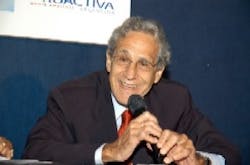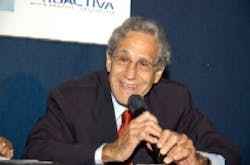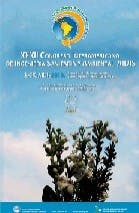Guest Viewpoint: Universal Access to Water & Sanitation
By Carlos Rosito
• AIDIS president marks 'Water for All by 2025' among goals for Latin America and the Caribbean
The Asociación Interamericana de Ingeniería Sanitary y Ambiental (AIDIS) -- or Inter-American Association of Sanitary and Environmental Engineering -- is a non-profit organization that pursues activities in water, wastewater, solid waste and environmental sciences for improvement of the environment, public health and quality of life in the Americas from Tierra del Fuego to the Hudson Bay. While it has a strong emphasis on Latin America, Canada and the USA host two of its largest chapters.Background Brazil's Carlos Alberto Rosito, president of AIDIS Interamericana, at an AIDIS Argentina event in April 2008.Not by chance, the activity of AIDIS is similar to that of the American Water Works Association (AWWA) and Water Environment Federation (WEF), the most famous water industry professional associations in the USA and Canada -- as well as the International Water Association (IWA) on a worldwide basis.
>> Nov. 8-11: 26th AIDIS Central American Regional Congress, Guatemala City: www.aidis.org.br
>> Nov. 22-25: 13th AIDIS Bolivarian Region Congress, Lima, Peru: www.aidis.clFor advance information on the XXXII Inter-American Congress on Sanitary and Environmental Engineering to be held Nov. 7-11, 2010, in Bávaro, Punta Cana, Dominican Republic, click here.
The AIDIS founding, on the 14 April, 1948, during the first Inter-American Congress of Sanitary Engineering in Chile, represented a historic event for the sector and was an idea of the Pan American Health Organization (PAHO) officers who founded the World Heath Organization (WHO) the same week. Many were already members of these American professional associations.
Today, AIDIS acts in 32 countries of the Americas and includes over 10,000 active members, through 23 national chapters and one regional chapter, with more than 30,000 professional members listed in their files.
As do AWWA and WEF, AIDIS elects its presidents two years before the launching of their respective terms. From the launching of my nomination to the presidency of AIDIS in February 2006, I have announced three priorities determined jointly with AIDIS colleagues that supported my name.
Universal Access & Other Goals
The most important goal will be to catalyze the fight for "Universal Access to Water and Sanitation" by the year 2025 in the entire region. This so great a goal has an intermediate target: fulfillment of UN Millennium Development Goals for water and sanitation sector -- halving by 2015 the number of people that lacked coverage of these services in 1990.The second priority is modernization of AIDIS, particularly with regard to communication, both internal and external. AIDIS' worth is mainly the result of its 24 national and regional chapters, representing its strong network of active members and 30,000-plus related professionals working together in America. We must improve the mutual knowledge and cooperation among members of this network. The third priority will be to conclude the new strategic plan, a task begun in the term of Dr. Adalberto Noyola, AIDIS past president and director of environmental EVENTOS ESPECIALESAmong key AIDIS events in 2009:>> Sep. 20-25: 25th Congresso Brasileiro de Enhenharia Sanitaria e Ambiental, Recife, Brazil -- annual conference of ABES, the Brazilian national chapter of AIDIS, which expects ov er 5,000 attendees and an exposition of more than 10,000 square meters: www.abes-dn.org.br>> Nov. 8-11: 26th AIDIS Central American Regional Congress, Guatemala City: www.aidis.org.br
>> Nov. 22-25: 13th AIDIS Bolivarian Region Congress, Lima, Peru: www.aidis.clFor advance information on the XXXII Inter-American Congress on Sanitary and Environmental Engineering to be held Nov. 7-11, 2010, in Bávaro, Punta Cana, Dominican Republic, click here.
engineering at the Universidad Nacional Autónoma de México. It's been 20 years since the Strategic Plan AIDIS 2000 was implemented and our small world has changed enormously in these two decades. We must update our vision and clearly state what we want to be in 2020 and beyond.
The Inter-American Water Day (the first Saturday in October), an initiative begun in 1992 and lead by AIDIS, PAHO and the Caribbean Water & Wastewater Association (CWWA). Since 2002, the Economic Commission for Latin America and Caribbean (ECLAD), Organization of American States (OAS) and United Nations Environment Program -- Regional Office for Latin America and Caribbean (UNEP-ROLAC) have also joined the program.
In the relevant field of capacity building, where our national and regional chapters already offer more than 600 annual opportunities to the members and professionals of the sector, we'll give special attention to three subjects of great relevance for improvement of management: 1) Non-Revenue Water, 2) Energy Efficiency, and 3) Tariffs and Subsidies Systems.
When I began working in the water sector in '60s of the last century, coverage of the water, sewer, wastewater treatment and solid waste management services was still much more deficient than nowadays. Out of the few more than 200 million inhabitants we were then in the Latin America and Caribbean region, only a third had services for piped water and sewer systems didn’t cover more than 14% of the population.
In the 40 years since, we advanced a lot with regard to the water supply (covering nearly 90% of over 500 million inhabitants of this region today); just a little in sewer systems (covering half of the people) and in collection of solid waste; and very little in wastewater treatment and suitable final disposition of solid waste.
So, we have still a long way to go and we cannot rest before making available proper water and sanitation services to all the men and women of our continent.
New Core Programs
Aside from these three main goals -- 1) Water and Sanitation for All by 2025, 2) Modernization of Communication, and 3) a New Strategic Plan AIDIS 2020 -- in the last two years, when I tried to extend the knowledge of our national and regional chapters and our external partners, I realized the interest to add five relevant programs to the backbone of our actions in the future.
We will give great attention to Water Safety Plans (WSP), a subject in which we're already involved strongly in the continent, acting together with PAHO, WHO, the Water & Sanitation Program (WSP) of the World Bank, the U.S. Environmental Protection Agency (EPA) and Centers for Disease Control (CDC). Coca-Cola is also an important partner in this project.
We will also keep our strong presence in the Water Operators Partnership in Latin America and Caribbean Region (WOP LAC) -- jointly with the Interamerican Development Bank (IDB) and the United Nations Habitat program.
Aside from these three main goals -- 1) Water and Sanitation for All by 2025, 2) Modernization of Communication, and 3) a New Strategic Plan AIDIS 2020 -- in the last two years, when I tried to extend the knowledge of our national and regional chapters and our external partners, I realized the interest to add five relevant programs to the backbone of our actions in the future.
We will give great attention to Water Safety Plans (WSP), a subject in which we're already involved strongly in the continent, acting together with PAHO, WHO, the Water & Sanitation Program (WSP) of the World Bank, the U.S. Environmental Protection Agency (EPA) and Centers for Disease Control (CDC). Coca-Cola is also an important partner in this project.
We will also keep our strong presence in the Water Operators Partnership in Latin America and Caribbean Region (WOP LAC) -- jointly with the Interamerican Development Bank (IDB) and the United Nations Habitat program.
The Inter-American Water Day (the first Saturday in October), an initiative begun in 1992 and lead by AIDIS, PAHO and the Caribbean Water & Wastewater Association (CWWA). Since 2002, the Economic Commission for Latin America and Caribbean (ECLAD), Organization of American States (OAS) and United Nations Environment Program -- Regional Office for Latin America and Caribbean (UNEP-ROLAC) have also joined the program.
In the relevant field of capacity building, where our national and regional chapters already offer more than 600 annual opportunities to the members and professionals of the sector, we'll give special attention to three subjects of great relevance for improvement of management: 1) Non-Revenue Water, 2) Energy Efficiency, and 3) Tariffs and Subsidies Systems.
Finally, with regard to strengthening membership, I'm sure there's great potential. The average active members of AIDIS in relation to the population in our 24 national and regional chapters is about 20 active members for each million inhabitants, almost 10 times less than the same in relation to the AWWA in the USA and Canada and 12 times less than the Australian Water Association in Australia.
Conclusion
With an improved synergy, using modern mass media and suitable human resources for such aims, I have hopes to increase a lot mutual knowledge between the various AIDIS chapters and their members. This should change the math such that total membership will increase in the medium and long term and reach 15,000 active members by 2015 and 20,000 by 2020. Similar numbers already exist in the archives of our national and regional chapters. WWi
Author's Note:
In addition to being the current president of AIDIS, Eng. Carlos Alberto Rosito is on the Counselors Board of Saint-Gobain Canalização Ltda, in Rio de Janeiro, Brazil. He's also a member of ABES -- the Brazilian national chapter of AIDIS, vice president of the Associação Brasileira dos Fabricantes de Materiais e Equipamentos para Saneamento (ASFAMAS), and a boardmember of the Associação Brasileira da Infra-Estrutura e Indústria de Base (ABDIB) and Federação das Industrias do Estado de São Paulo - Departamento de Construção Civil (FIESP/DECONCIC). For more information,, contact Isaac Zilberman, AIDIS executive director: +55 (11) 3812-4080, [email protected] and www.aidis.org.br###


